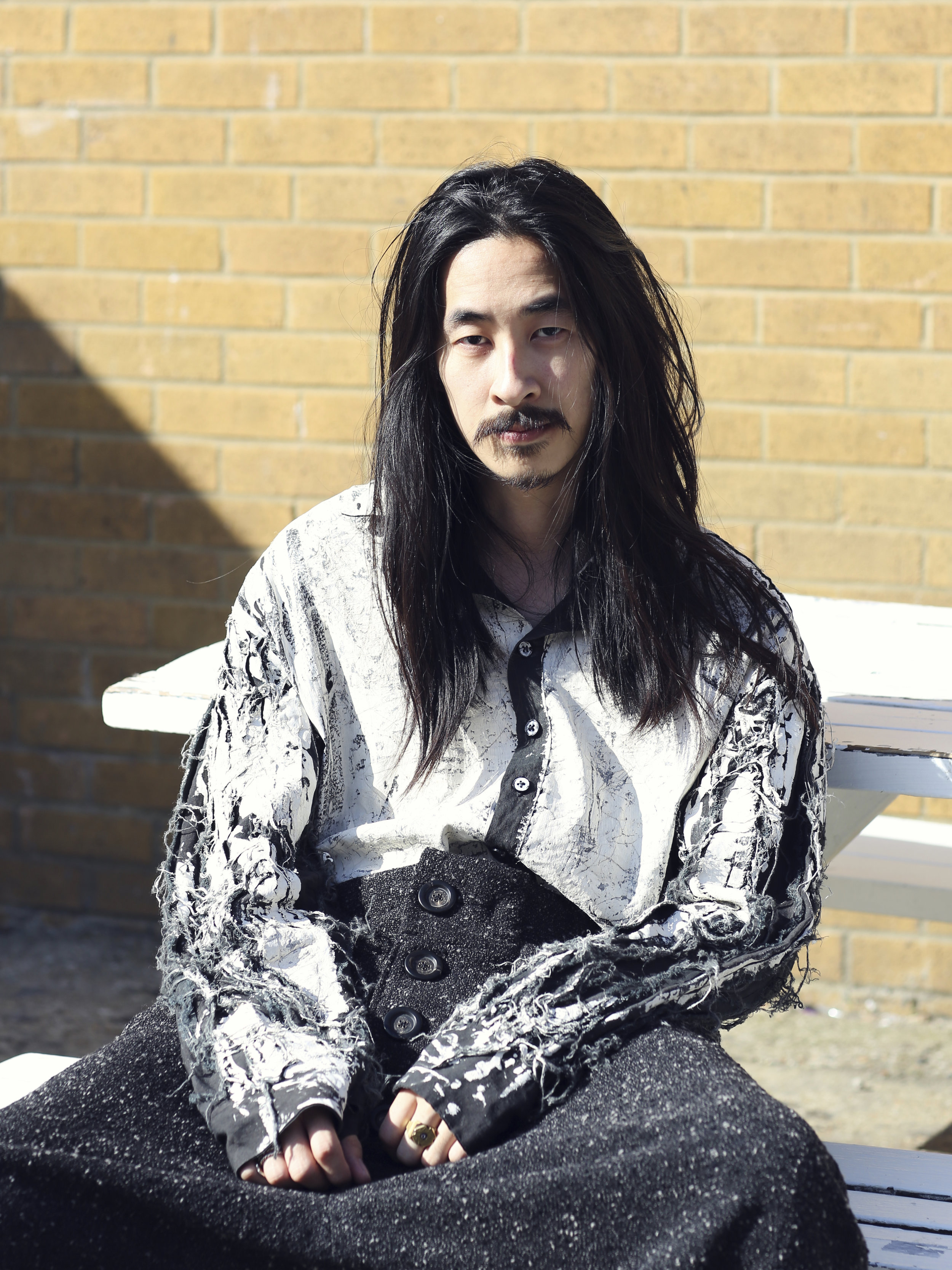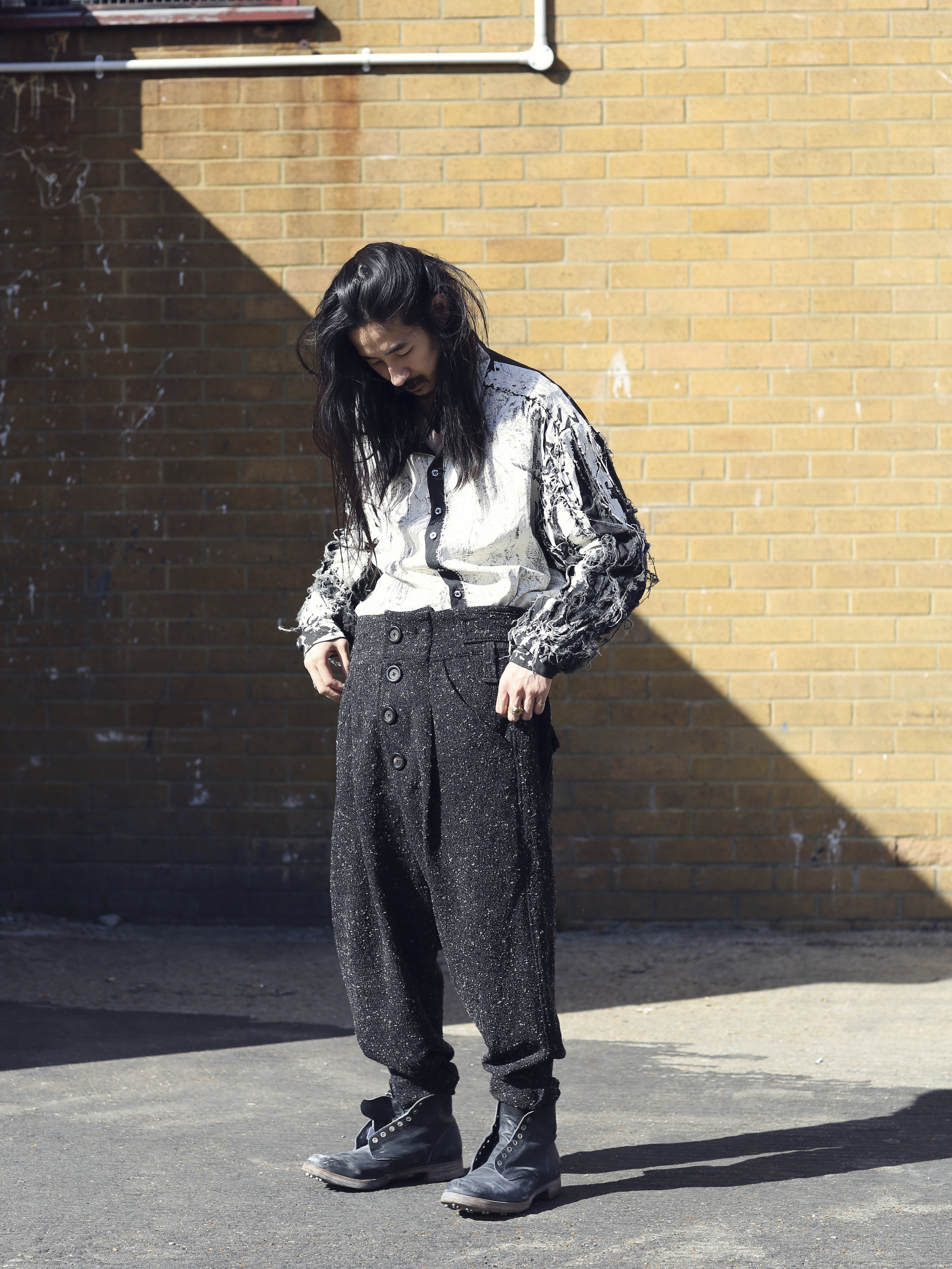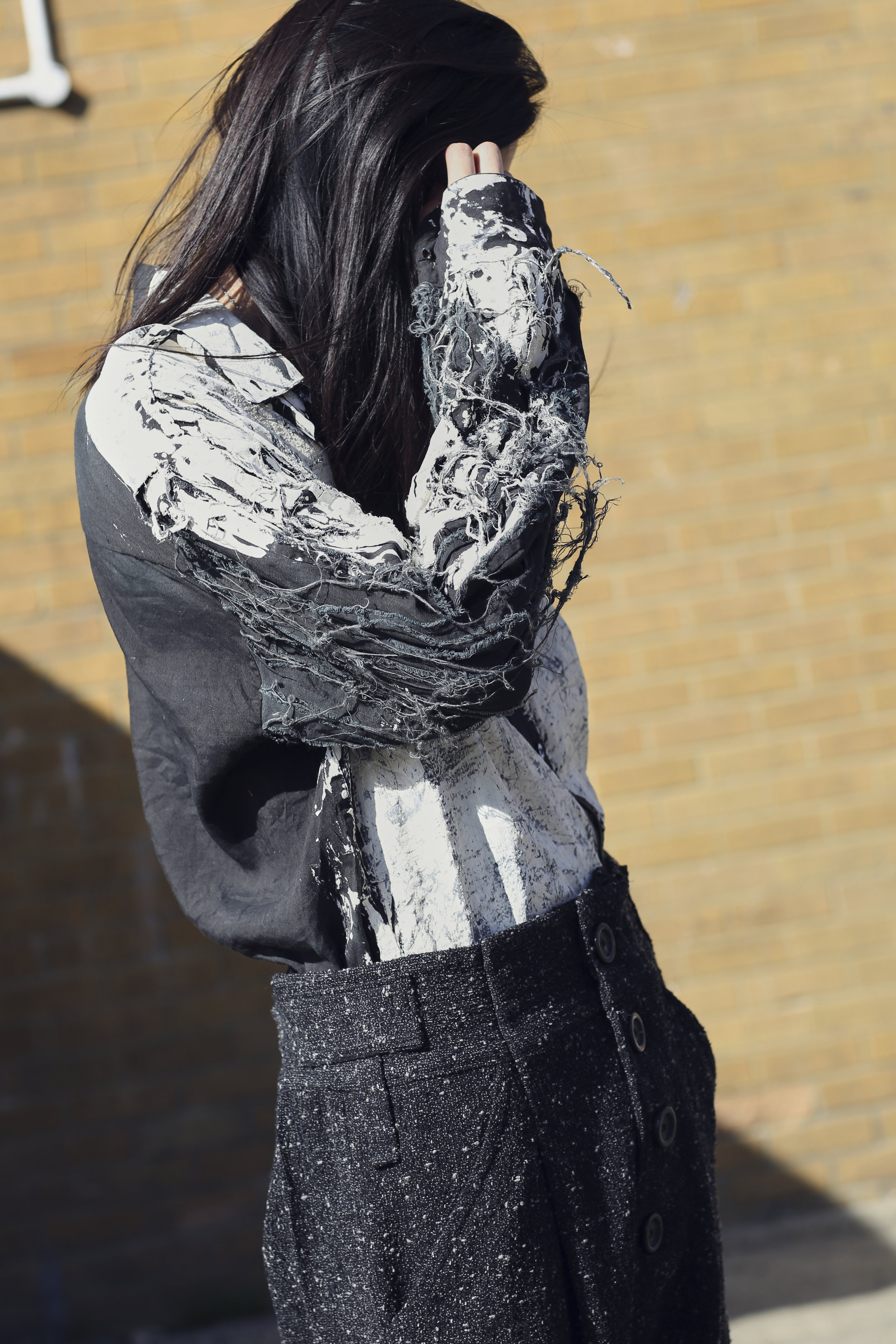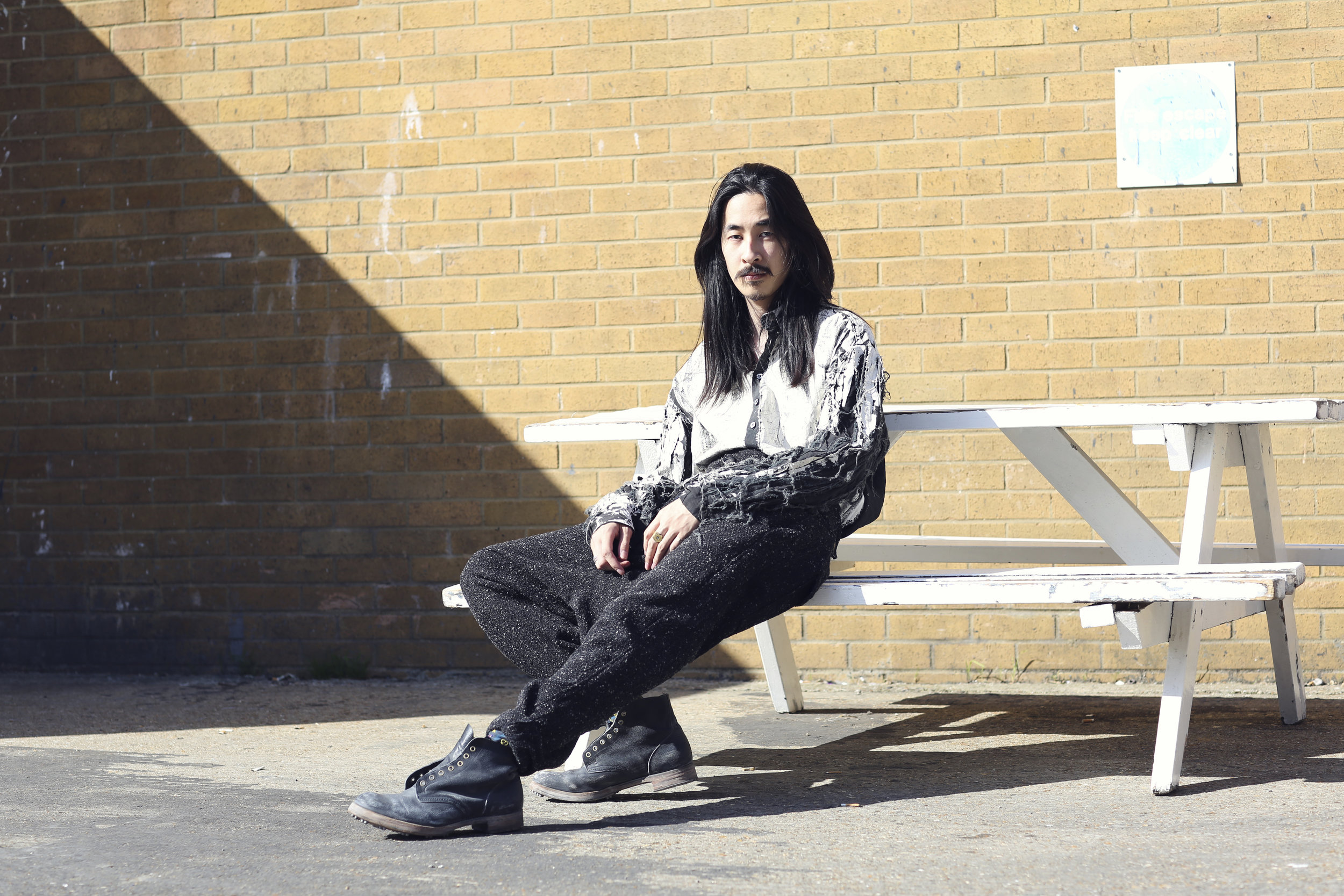You may follow Karlmond Tang already. If you don’t then you probably should, because his interesting and unique perspective on fashion, is one of the most genuine that you’ll come across in the digital age of pretending. During our photo shoot, our digital editor grabbed a few words with Karlmond to bring you some thoughts from the artist and writer. Here he offers advice on how to strike a balance between social media and self expression, and offers a refreshing perspective that seeps knowledge without any pretension. Oh, and why you should never tell someone that what they’ve done is wrong.
So, what made you get into blogging?!
Well, I started a career in finance. So my degree was Chinese and economics.
Oh ok! Amazing. That must’ve been incredibly difficult.
I think all degrees are difficult you know. I mean Chinese is a hard language to learn, and I was learning a different side to my mother tongue, which is Cantonese, and um, the reason why I got into blogging is that, when I decided too… let’s just say long story short, when I decided to work in the fashion industry, I did an internship in PR. I was already doing quite a bit of writing, before I was in the fashion industry, just about mergers and acquisitions rather than...fabric.
Yeah. I mean they are similar...
(Laughter) Yeah similar. Well if you think about it, fashion is just as much a business as everything else is, and I think people neglect that aspect, but that was one of the reasons why I got into blogging. I’ve always liked writing, and I’ve always seen a blog as a platform where, it is essentially an online diary, where someone can voice whatever opinion they want. As I, I guess you could say I grew more mature as a blogger, you can always say what you want, as long as you state that it’s opinion. I don’t think you should ever tell someone what not to do as well. Which is something I learnt through styling. Don’t ever tell someone that something is wrong.
Is that why you like being involved with GFW, because graduates are all about personal expression, when they first come out of uni?
I really like working with graduates. Education was a big thing for me. I loved my english teachers growing up. The reason I really like working with graduates is because it’s the next generation of new talent and for them, for a lot of graduates, it really is freedom of expression in such a pure sense. Before they've realised about production and business, it’s these guys who are like, this is what I want to express, and they can do it with their hands. I am highly envious of that, I’d love to promote that, I think it’s brilliant.
That’s cool, that’s really good. A lot of our graduates go into really big companies and obviously you’re part of a brand identity then, so as much as that’s freeing in a different way, it’s not so much an expression of ‘you’.
I guess when you’re joining a brand or a company it’s about how can you make your stamp or how can you join a company that I feel my message can become part of. It’s like when you’re working for a title on the press side of things, how can I write for a magazine that has the same tone of voice that I want to express. Are they approaching anything from the same angle that I am? I guess with a designer, when you graduate, you’ve got two options. Do you go solo or do you go join a company and learn that way? I know people who have done both, and I get the appeal with both.
I’ve interviewed a few graduates, and it’s usually split down the middle.
You can always do one after another. Being involved with a large company gives you that confidence I think, to say, you can actually do it.
Totally. You know, McQueen was doing his own collection whilst he was doing Givenchy right? So I mean, it is possible, personally, I don’t envy the stress that any designer goes through, to play by any rules of collections and seasons.
What would you say your favourite thing about being here today has been?
I’m a bit of a fan of Damien Foxe. Because I am interested in- I don’t say it much. But I do do a bit of styling and photography off my own back. Damien is, one of those few names who does do the multifaceted side of things. I like watching someone like that work. Styling and photography, they work in harmony. There are a few photographers I’ve worked with who just want to take the image, and there has been a few photographers that I’ve worked with, that are as into the styling as they are the photography. I really respect that side of things because it is a 360 thing to produce a shoot like this. I’m very interested in watching Damien work to be honest.
So would that be some advice you would give to a graduate, getting involved in all different sides of the industry?
Yes, 100%. As a designer, what you forget is- I’m sure people don’t forget this- but you are creating your work for someone else to wear. You have a vision of how your clothing looks, but someone else might have a different vision. And it’s not that it’s a good or a bad vision but maybe it's the sort of thing that you need to open your perspective, on how you can design. It’s the same way that if you work a photographer, all the photographers or stylists that I’ve worked with, talk and talk and talk about the shoot. The more we talk about it, the more concise it becomes. So, as a designer, I imagine, if you’re working with, I know PR agencies have a big role (well they used to have a big role) in helping young designers hone their careers in the business side of things, in the image side of things, but if you’re working with, I mean McQueen is an easy one for me to reference because I’ve read that book, the Judith White one, but...Simon Costin, he was the one right?
He bought McQueen, Lee’s, world to life and I love that. Because you’re not just presenting the clothes, you’re presenting the person who wears it, and presenting the world that it’s in. As a designer, you can really open your eyes as you’re working with these people, to help visualise the world that the designer wants to create.
People talk a lot about fashion and art, and whether they are one and the same thing, as an artist that also works within fashion, would you say that fashion is about creating the fantasy world that art also seeks to create?
Art is a funny one because I think art comes in all shapes and forms.
I was having a conversation with somebody the other day and they said they don’t understand how all the collections end up having similar themes. If you look at the art exhibitions that have been around at that time, you can see where they’ve gotten their inspiration from. As well as obviously popular culture and politics and everything else.
It’s what you see with your own eyes, or in this case with your own phone. That kind of inspiration of how an artist expresses themselves, but also applying it to the world that we live in. It’s almost kind of what a designer does because you’re presenting these clothes but also in the world that we live in. Which obviously, gender fluidity being quite a big thing with these designers, who we’re working with today. I think that’s quite an important aspect in that you are doing something that’s part of the world that we live in. That I can see in the marriage with what an artist does and what a designer does. There is certainly, a similar outlook in creating something for the time that we live in.
There’s a currentness to the work that is being created. Currentness, that’s not a word. ‘currentness’.
If there was a graduate that was looking to get more into the social media side, but wasn’t necessarily a designer but had studied communications, or something like that, what advice would you give?
The thing with social media is, try to keep it as true to you as possible. That’s the only advice I can give. People might not like it, but, it’s noticeable when someone is doing it for them, and not just to get popular or get big. If anybody wants to look at a good social media presence just look at Judy Blame for example. With Judy Blame, all of his inspirations are there but his respect for other people's work is also there. He creates an ongoing mood board, where you still don’t know who Judy Blame is, but you’re almost getting an insight into his world, and how his mind works, that’s what I really like about individuals like him. I think with social media, I always talk about instagram but we’re only talking about instagram really, it’s the idea of, just try to be true to what you like, and that’s, if I had one thing to communicate, it is, who are you? That’s the most important thing. Who are you? Be you.
Because everybody else is already taken. Oscar Wilde said be yourself, because everyone else is already taken.
I like that quote. I think that’s quite relevant for social media, I think the minute you try to build this character who you’re not, it kind of shows. I’ve met a few people who have this persona on social media and then, all of a sudden they’re not that person. It is a bit weird, it’s a bit jarring. Don Letts, who is big in the music world, one day I was talking to him about social media, and he was like, so Karlmond, how does this follower business work? Because I don’t follow people. I’m not a follower, I’m a leader.
Interview by Annabel Waterhouse-Biggins






